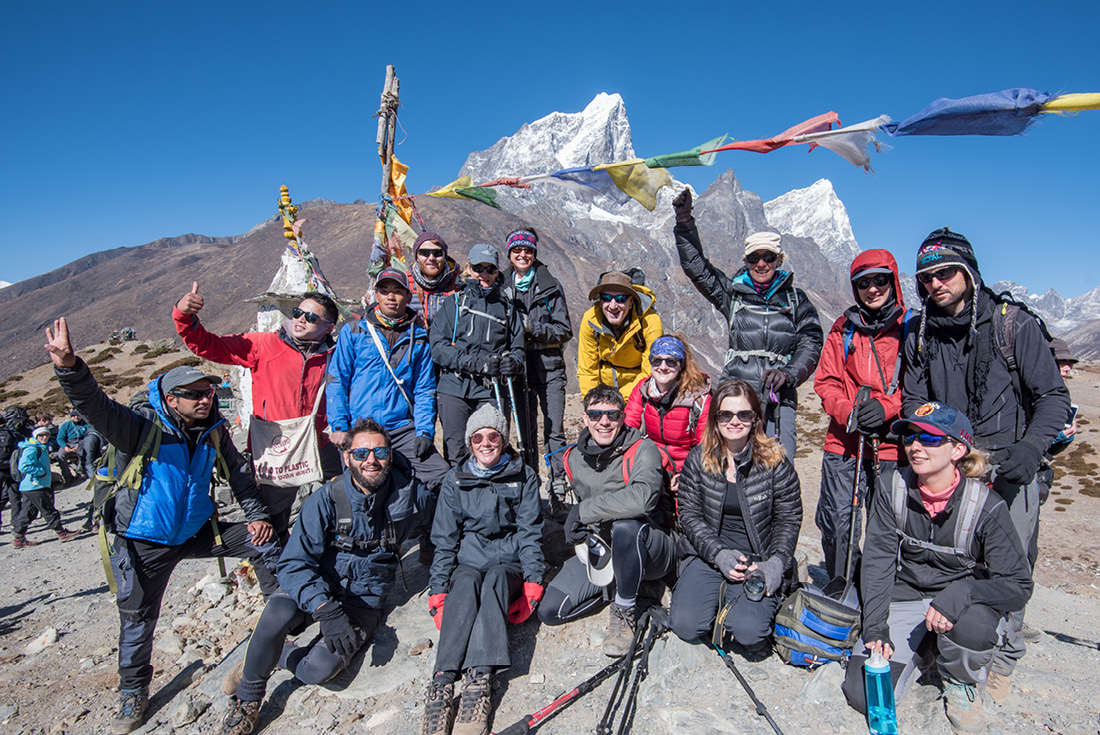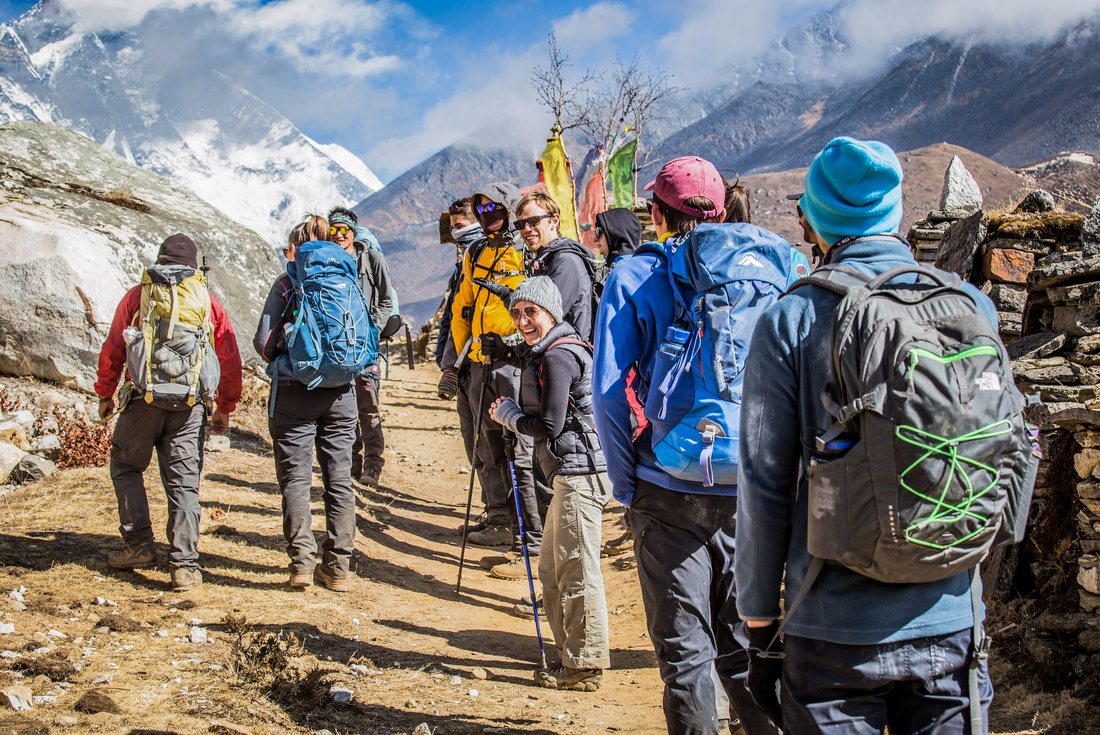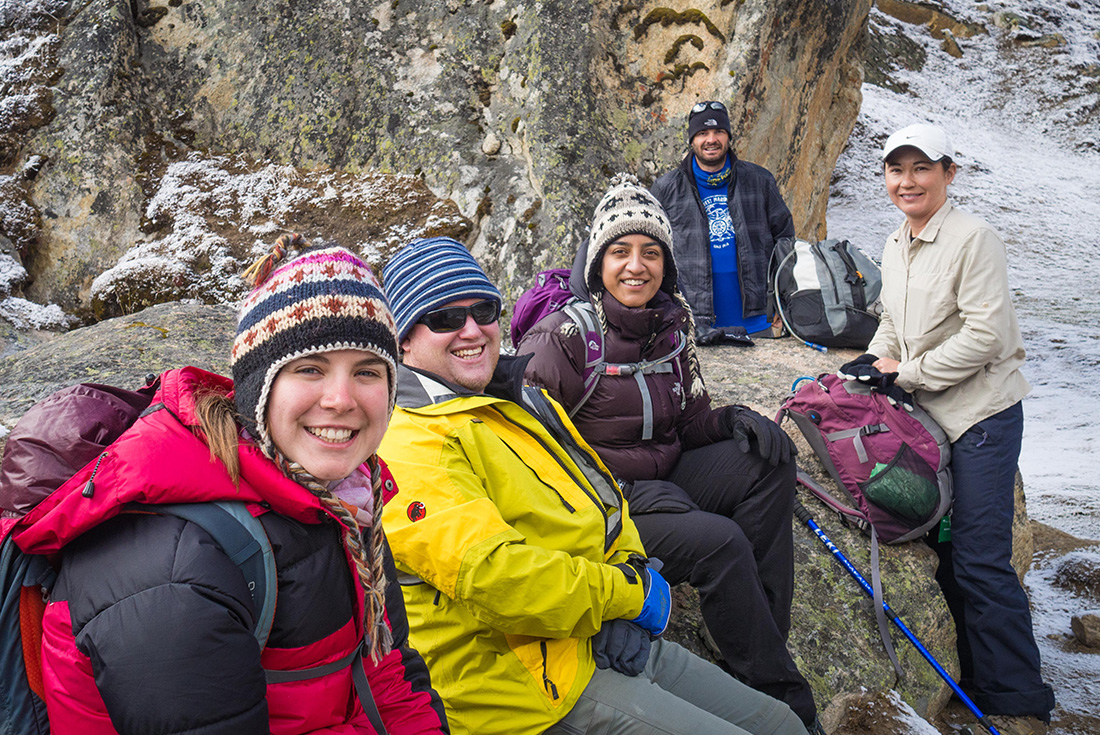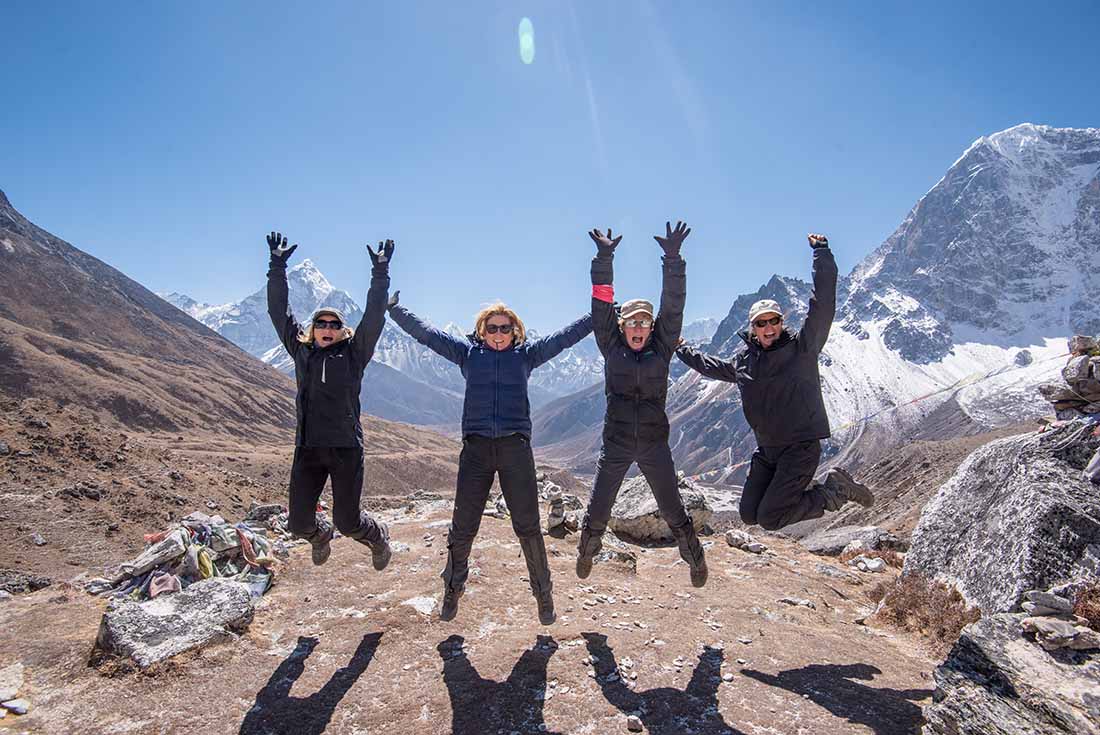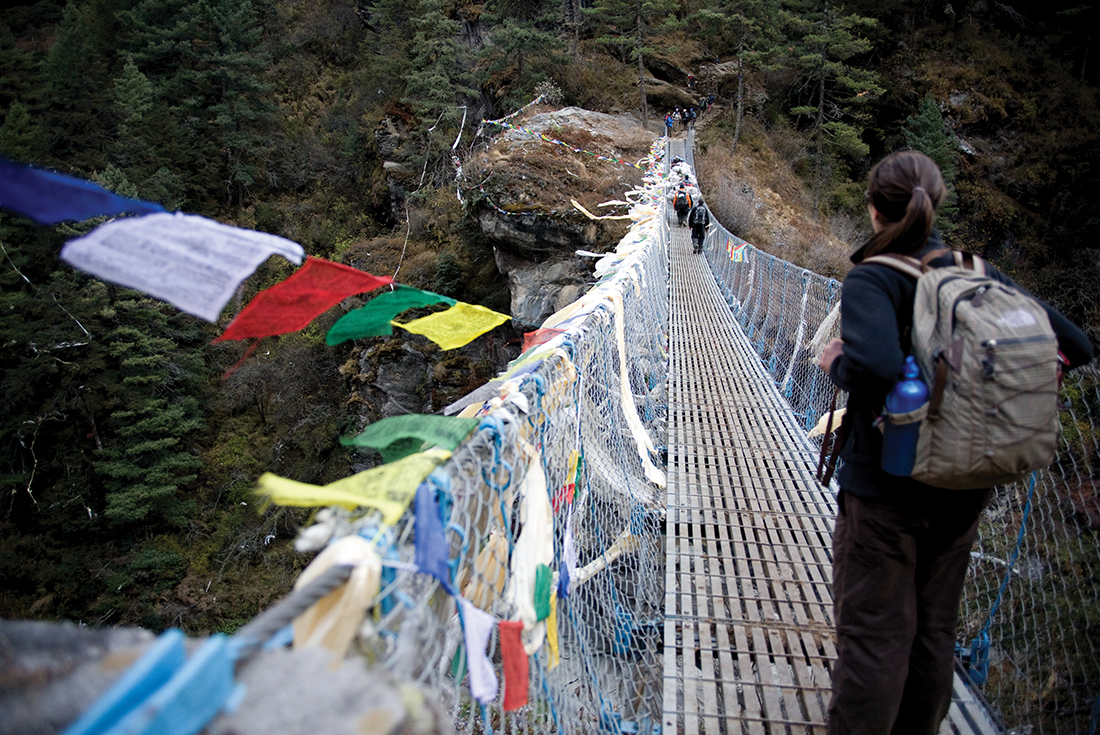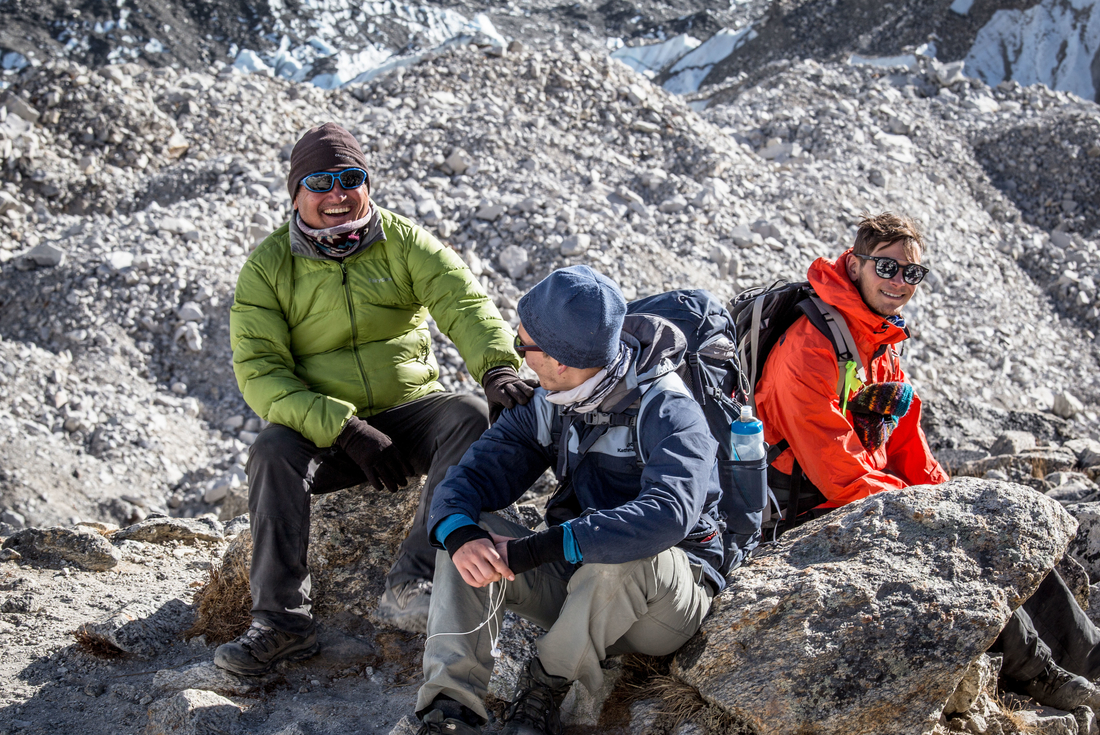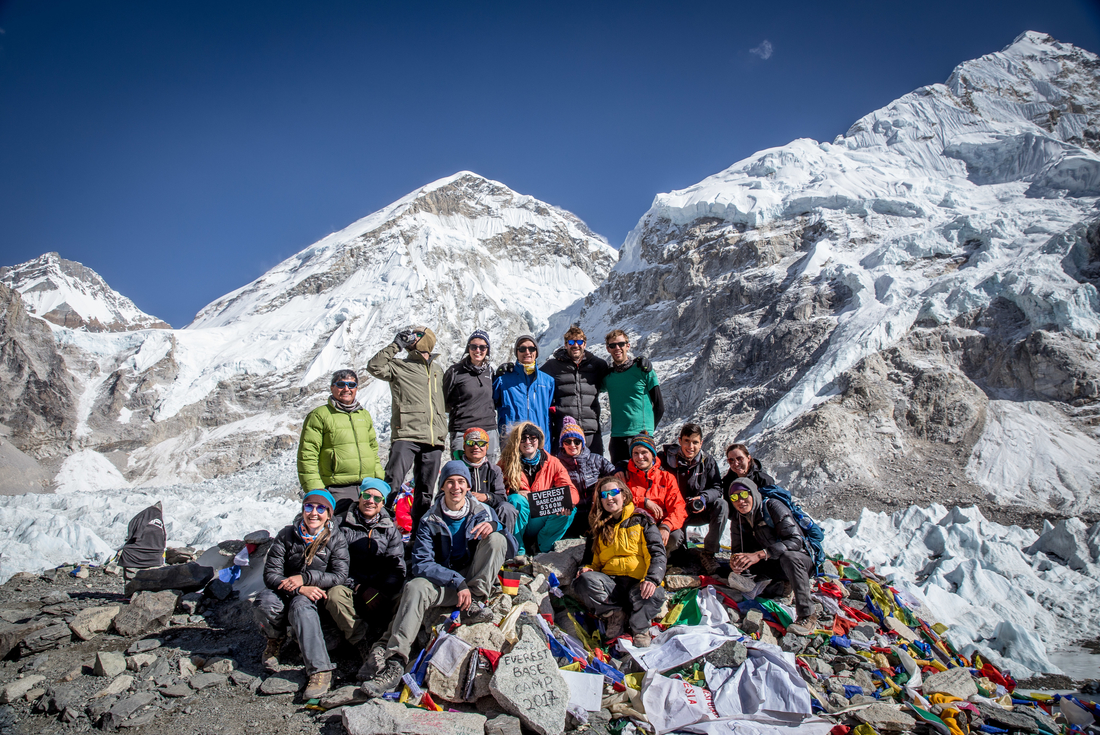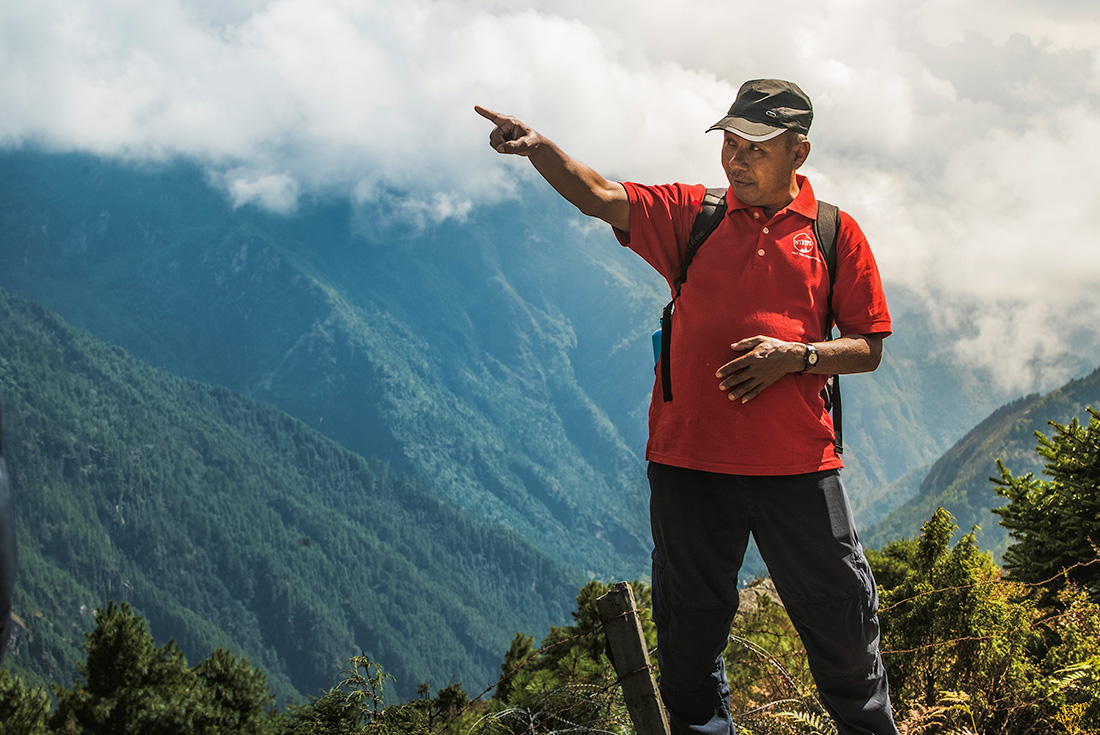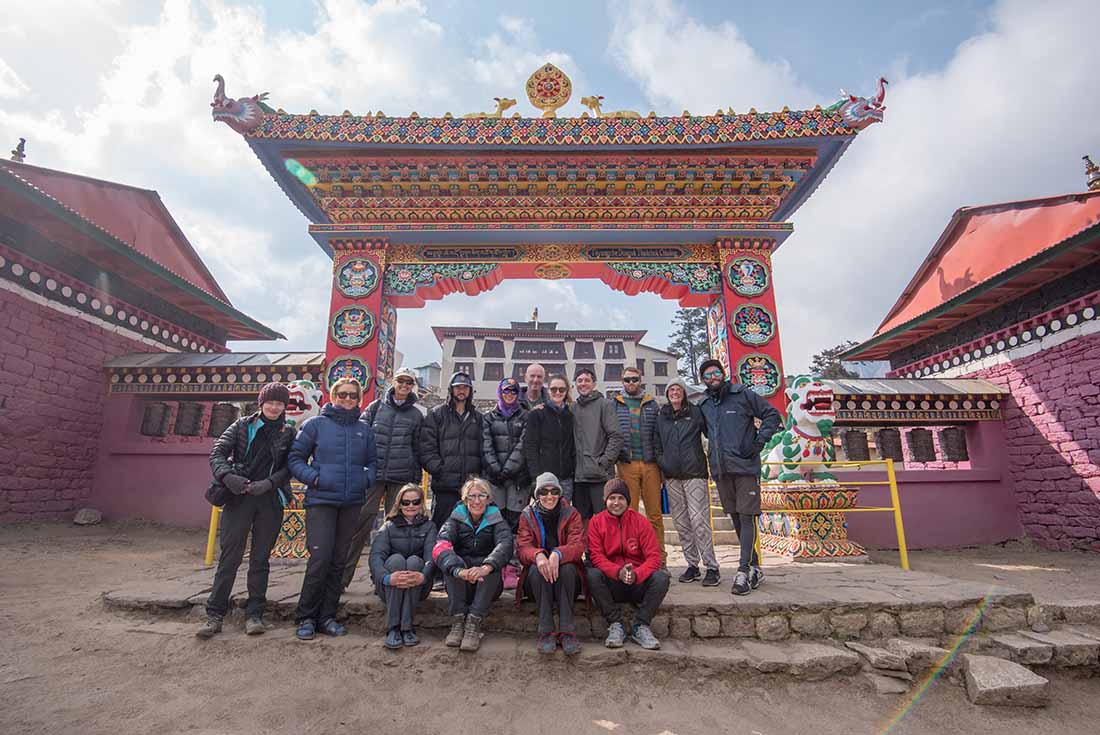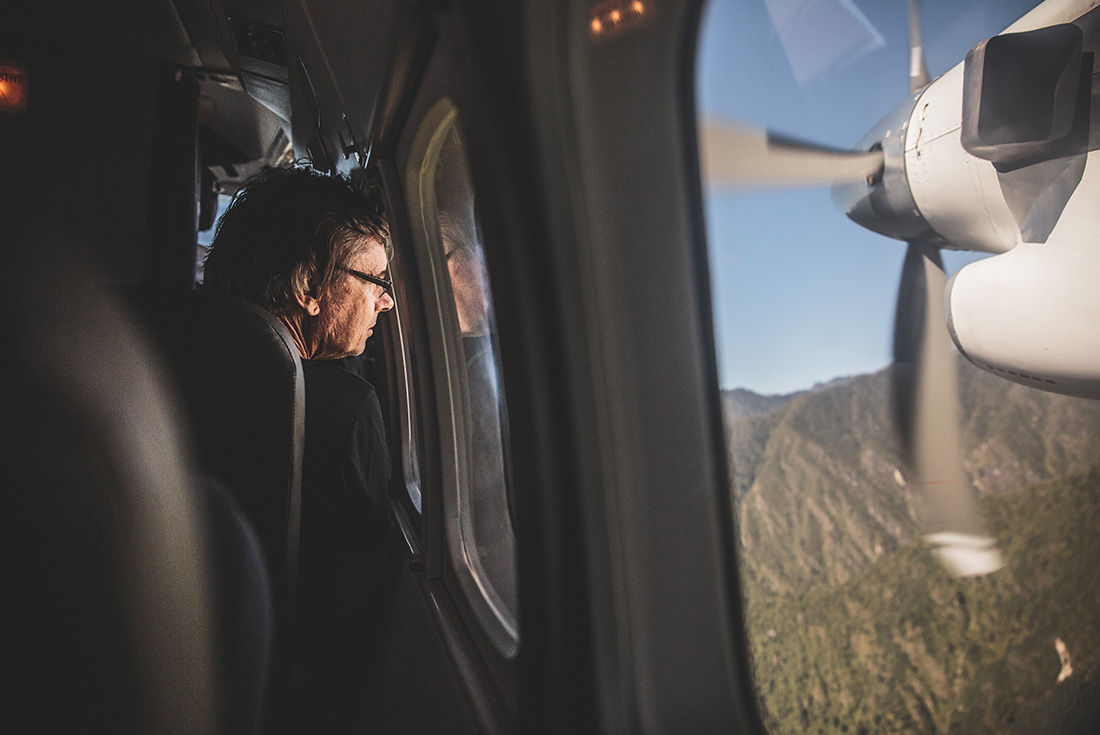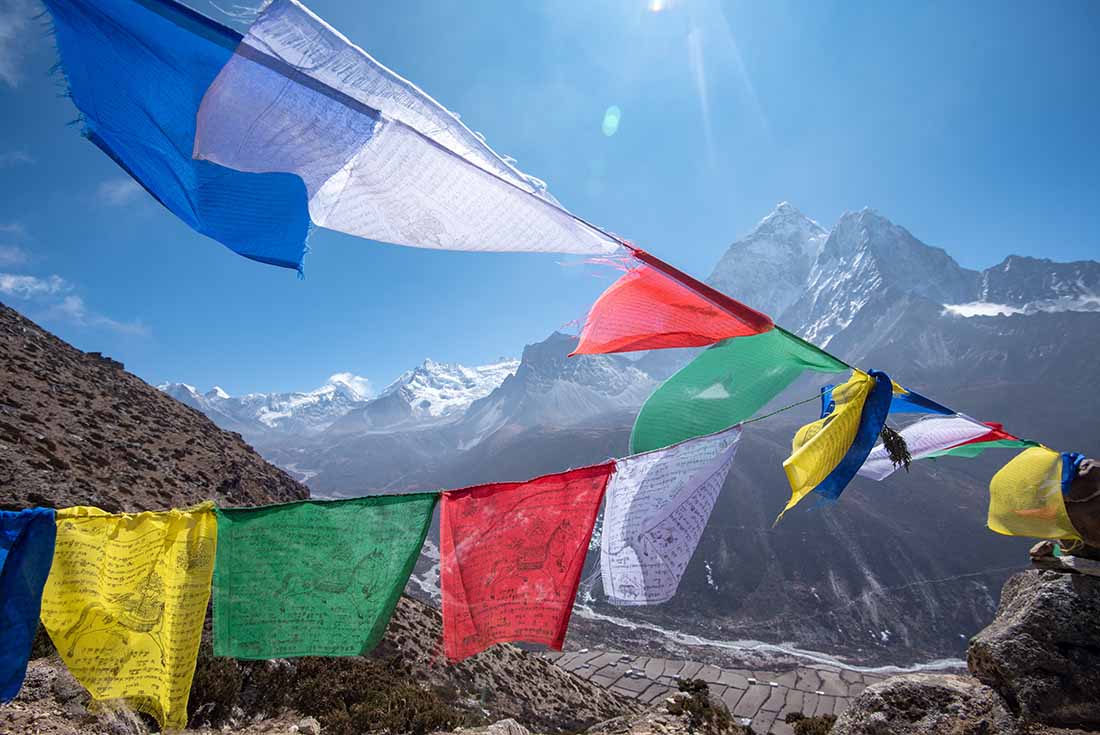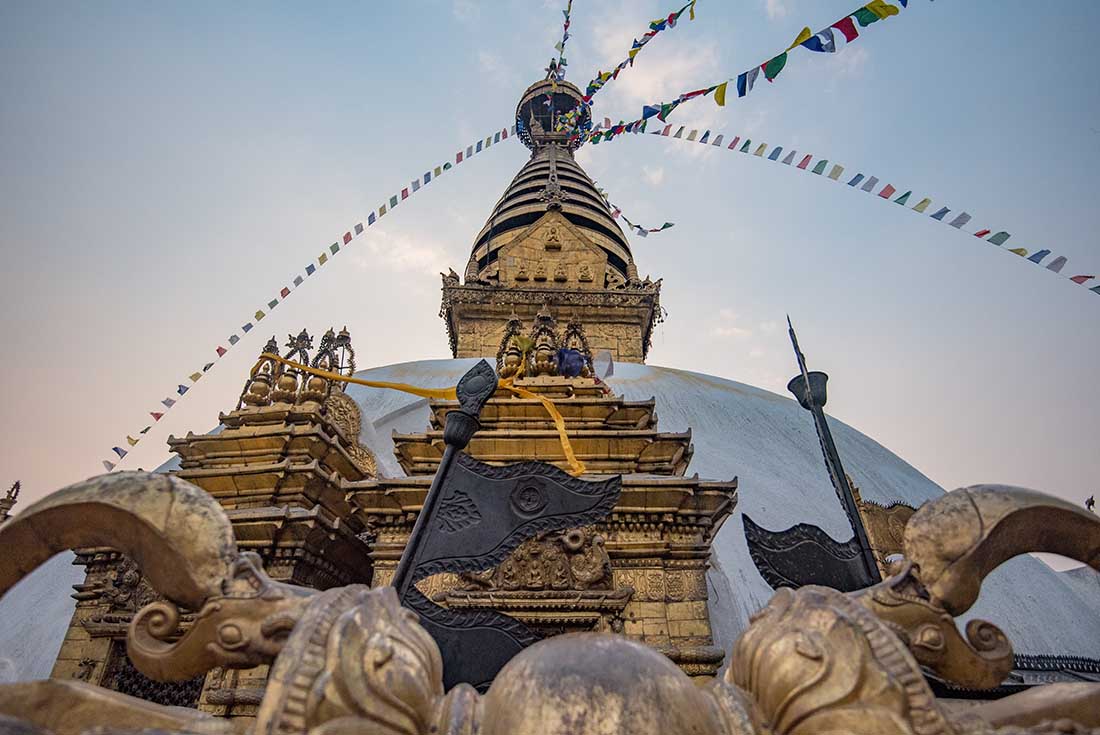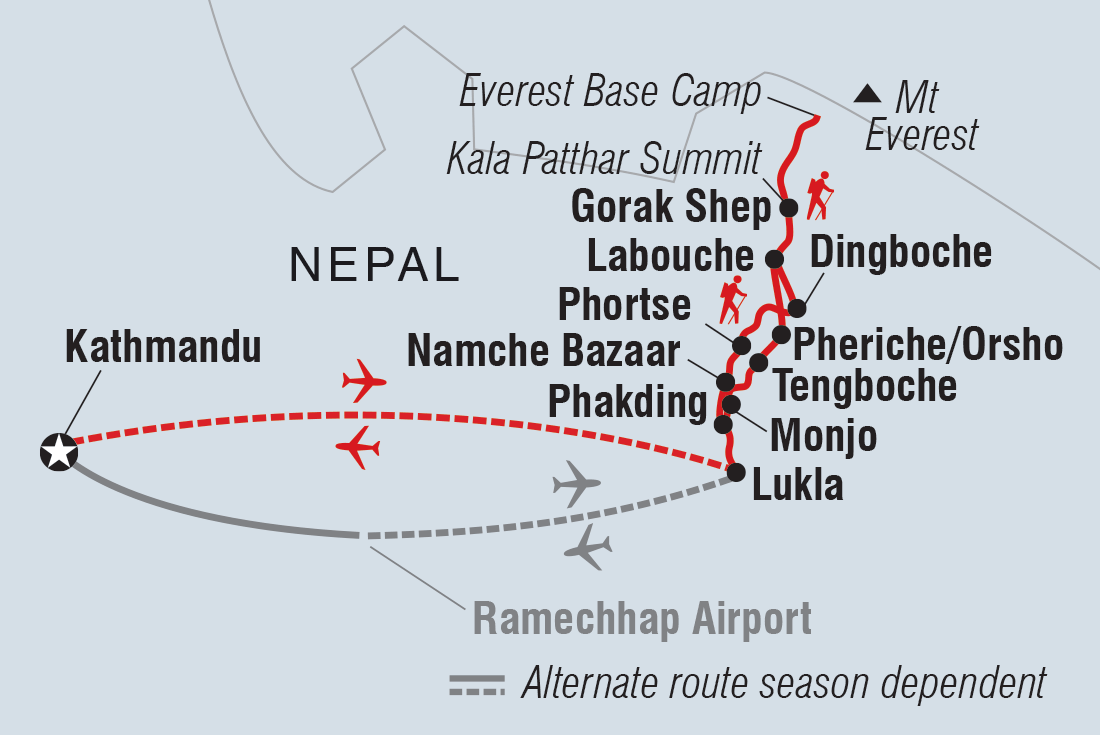Account Number : 63245268
Sort Code : 204281
Everest Base Camp Trek
Everest Base Camp Trek
Base Camp. Two little syllables that conjure up dreams as immense and powerful as the Himalayas themselves. This 15-day trekking trip is your chance to take on the challenge of reaching the mountaineer's base camp and gain an insight into the world-renowned Sherpa culture. You’ll cross glaciers and broad plains, traverse valleys and climb high passes – discovering both the majesty of the mountains and your own potential. Embrace the sense of freedom that comes with leaving cell service behind for card games in basic (but cosy) teahouses. Plus, Intrepid partners with local mountaineering and porter welfare programs, so you can trek easier knowing that while our porters are taking care of you, there’s someone looking out for them. This is a challenging trip and involves difficult trekking at high altitudes, but the whole experience can summed up in two syllables – worth it. ALTERNATE ITINERARY: In case of weather conditions leading to cancellations or delays in included flights, this trip will operate on an alternate itinerary. Please see day 1 of the itinerary for more details.
Tour At a Glance
- Witness still alpine lakes, glacial plains, frothy rivers and valleys covered in pink blossoms, depending on the season.
- Experience the comradery of trekking with a small group as you challenge yourself to reach new heights on one of the world’s greatest hikes.
- Get your first glimpses of the mighty Himalayan range on the included flight from Kathmandu to Lukla – the famous airport in the sky.
- Hike with an experienced and passionate locally-based leader as well as a team of guides and porters who will introduce you to rich Sherpa culture.
- Travel knowing that our treks operate according to standards that provide respectful, safe and fair working conditions for your porters and guides.
- Tour code: HNXE
- Group Adventure
Dates & Prices
Is this trip right for you.
- The weather can be unpredictable in the Himalayas and every year a significant number of trips have flights to or from Lukla delayed or cancelled due to weather conditions. See day 1 of the itinerary for the alternative plans should this happen on your trip.
- Hiking the Himalayas is no walk in the park. But seriously, this trip includes 12 days of trekking for up to eight hours per day, reaching altitudes of over 5500 metres. Depending on the time of year, the weather can be harsh. Ask anyone who has done it and they will say the rewards are worth it, but we can’t stress enough that you must be in excellent health to participate. Think you’re up for it? Find our step-by-step training guide here: .
- The trekking lodges, known as teahouses, that we stay in on the trek are very simple with only basic facilities. Access to electricity points for charging devices will cost extra. Wi-Fi is available at some locations, but connections may be poor.
- The scenery and conditions vary between seasons. Please carefully consider the time of the year you wish to trek in and consult this packing guide .
- The Everest Base Camp trek is a very popular route and you will encounter many other trekkers and groups on the trail and at the teahouses. If you are after a trek that sees less travellers and spends more time trekking through communities rather than on a more established route, see our Tamang Heritage & Langtang Valley Trek (HNXV).
- This trip includes one or more overnight stays over 3500 metres (11500 ft) where there is a genuine risk of being affected by Acute Mountain Sickness (AMS). If left untreated AMS can be life-threatening. While the vast majority will only feel discomfort, it is not uncommon for a small number of people to need extra care which will be provided by our leaders and local staff. All our trips that spend time at high altitude follow our standard altitude safety measures. A number of medical conditions and medications can also reduce your body's ability to acclimatise, and thus will affect your performance at altitude and make you more susceptible to AMS. If you are worried about any pre-existing condition (e.g. heart problems), or unsure of your physical ability, you must seek medical advice prior to booking. You may also wish to discuss medication such as Diamox that may help aid acclimatisation. Read more about AMS here:
Accommodation
- Hotel (2 nights)
- Teahouse (12 nights)
Joining point description
Hotel Marshyangdi is situated in the heart of Thamel, Kathmandu’s tourist mecca. Its variety of restaurants and shops, pulsing nightlife and easy access to major tourist sites and the airport make it a convenient place to stay. www.hotelmarshyangdi.com
Joining point instructions
There are two pre-paid taxi booths inside the terminal, one on each side as you exit the baggage claim area. They have fixed rates of NPR800 to anywhere in the Thamel area from 6am-8pm and NPR1000 from 8pm-6am. Otherwise you will need to bargain hard from the taxi rank outside of the airport - aim for NPR600. The drive into Thamel takes 30 to 40mins dependent on the traffic.
Please be aware that there may be porters outside the terminal offering their services for a fee. If you do not wish to use their services, be ready to kindly but firmly let them know.
Alternatively Intrepid offer a pre-arranged transfer service option. Enquire with your agent and advise your flight arrival details at least 14 days prior to your trip departure. For your confirmed arrival transfer, you’ll be met outside Kathmandu airport by a transfer representative holding an Intrepid sign. If you have any trouble locating your transfer rep, or if your flight is going to be delayed, please call: +977 980 112 3617
The hotel is approximately 200 metres north from the Kathmandu Guest House.
Normal check in time at the hotel is after 12:00.
Finish point description
Hotel Marshyangdi is situated in the heart of Thamel, Kathmandu’s tourist mecca. Its variety of restaurants and shops, pulsing nightlife and easy access to major tourist sites and the airport make it a convenient place to stay. www.hotelmarshyangdi.com
Finish point instructions
- A taxi to the airport will cost about NPR 800 from 06.00-20.00 and NRP 1000 from 20.00-06.00. Hotel reception or your group group leader or local representative or local representative can help you organise a taxi.
- Normal check out time is 12 noon. If you are departing later in the day or evening, you can arrange luggage storage at the hotel.
Safety
- Most national governments provide regularly updated foreign travel advice on safety issues involved with international travel. We recommend that you check your government's advice for their latest travel information before departure and ensure that your travel insurance covers you for all destinations and activities on your trip. Please refer to our website's safety page for links to major travel advisories and updates on safety issues affecting our trips here: We strongly recommend the use of a neck wallet or money belt while travelling, for the safe-keeping of your passport, flight tickets, cash and other valuable items. Leave your jewellery at home - you won't need it while travelling. Many of our hotels have safety deposit boxes, which is the most secure way of storing your valuables. A lock is recommended for securing your luggage. Your group leader or local representative will accompany you on all included activities, however, during your trip you'll have some free time to pursue your own interests or relax and take it easy. While your group leader or local representative will assist you with the available options in a given location, please note that any optional activities you undertake are not part of your Intrepid itinerary, and Intrepid makes no representations about the safety of the activity or the standard of the operators running them. Please use your own good judgement when selecting an activity in your free time. Please also note that your group leader or local representative has the authority to amend or cancel any part of the trip itinerary if it's deemed necessary due to safety concerns. Intrepid's operational safety policies can be viewed on our website at the link below. We recommend that you take a moment to read through this information before travelling, and would appreciate any feedback on how safety is being managed on our trips.
- : Demonstrations and protests are common in Nepal, with strikes regularly occurring that may result in curfews or roadblocks being enforced at short notice. At these times, businesses may close and vehicles may not be allowed on the roads. You should avoid any demonstrations or political gatherings and follow local advice, including that of your group leader or local representative in the event of any disruptions. PETTY THEFT & CRIME: Pickpocketing and other petty theft is common, especially in places where tourists or foreigners frequent. Take care when walking around at night. Avoid walking on your own and don’t carry large sums of cash. Keep valuables in a hotel safe if possible. Bars and restaurants now close at midnight as part of a government crackdown on illegal activities. Foreigners remaining in bars and clubs after hours have been detained by the police. Police have increased their presence in Thamel and Durbar Marg, popular tourist districts in Kathmandu, in an effort to reduce crime in these areas. You should seek out police if you have been robbed or affected by any crime. ALTITUDE: Altitude sickness is a risk, including on the Annapurna, Langtang and Everest Base Camp treks. Please make sure you familiarise yourself with signs and symptoms before you depart and monitor your own health during your trek. INSURANCE: Make sure your insurance covers you for your intended activities, including travel and trekking above 3000m if this is included on your itinerary, mountain rescue services and helicopter evacuation costs. If your insurer does not provide this level of cover, helicopter evacuation will not be possible without upfront payment. FESTIVALS: Travelling in Nepal during Holi Festival (23-25 March 2024), can at times be dangerous due to revellers consuming intoxicating substances. The day is often associated with physical violence and danger. Your group leader or local representative will advise you and your group on what places to avoid on this day and it may even be necessary for us to alter your itinerary for the day to avoid putting you or your group leader or local representative in a high-risk situation. Travelling during the Hindu festival Diwali (12 Nov 2023, 1 Nov 2024) can also be dangerous. During this time there are many displays of fireworks in the streets. It can be very noisy for several days and there is also a lot of pollution caused by the fireworks. As there are no restrictions on buying fireworks there are often injuries caused by people exploding them inappropriately. During this festival, your group leader or local representative may be required to alter your itinerary to avoid any dangerous areas to avoid putting the group at risk. INTERNAL FLIGHTS: There have been a number of air accidents in Nepal. We only use airlines that have passed strict safety audits for included internal flights in Nepal, including Buddha Air, Summit Air.
Medical and health information
- All travellers need to be in good physical health in order to participate fully on this trip. For the safety and wellbeing of yourself and others, if you are unwell prior to travelling, please stay at home and contact us to make alternative arrangements.
- When selecting your trip please make sure you have read through the itinerary carefully and assess your ability to manage and enjoy our style of travel. Please note that if in the assessment of our group leader or local representative a traveller is unable to complete the itinerary without undue risk to themselves and/or the rest of the group, we reserve the right to exclude them from all or part of a trip without refund.
- You should consult your doctor for up-to-date medical travel information or for any necessary vaccinations before departure. We recommend that you carry a first aid kit as well as any personal medical requirements in their original packaging as they may not easily be obtained while travelling. If you are carrying medication, ensure you check your government's foreign travel advice for any local restrictions or requirements.
- Air quality in Nepal can be poor, especially in winter. Some towns, including Kathmandu, experience very high levels of seasonal smog and heavy particulate pollution. Seek medical advice if you're concerned about the effects of air pollution.
- Travellers to altitudes higher than 2,500m are at risk of altitude sickness, also known as acute mountain sickness (AMS). This can be life-threatening and affect anyone, even people who are very physically fit. There is a higher risk for those who have had altitude sickness before, who exercise or drink alcohol before adjusting to the altitude, or who have health problems that affect breathing. If your tour travels to high altitude, see your doctor for advice specific to you and your situation before you depart. It is important to be aware of the normal altitude symptoms that you may encounter BUT NOT worry about
- - Periods of sleeplessness
- - Occasional loss of appetite
- - Vivid, wild dreams at around 2500-3800m in altitude
- - Unexpected momentary shortness of breath, day and night
- - Periodic breathing that wakes you occasionally
- - Blocked nose
- - Dry cough
- - Mild headache
- If you are feeling nauseous, dizzy, or experience other symptoms, please be sure to let your group leader or local representative know immediately so that we can monitor your condition.
- Please be aware that should your group leader or local representative deem it unsafe for you to continue trekking at any time, they will arrange for you to descend to a lower altitude.
- Please read the following document carefully and, during your trip, utilise the table on the back daily to record your own perspective of your general health and any symptoms you may experience
- On some days this trip may ascend faster than commonly published recommended ascent rates at altitude. However, based upon an assessment by our external safety and medical advisors, and in conjunction with our own risk assessments, we consider that the ascent rate is acceptable due to the additional safety measures that are in place for our customers. If you have concerns about this, please speak to your booking representative.
- All our group leaders or local representatives in the Himalayas are trained in the use of a PAC bag (Portable Altitude Chamber) and this is carried on all trips which go above 4,200m. The PAC bag is used in an emergency only to treat altitude sickness in the mountains. A First Aid kit is carried with the group and all our group leaders or local representatives are First Aid trained. Please ensure that your travel insurance policy does cover you up to the maximum altitude on this trip, and includes helicopter evacuation. Please take proof of this with you on the trip, as you will need to show it to the group leader or local representative.
- Malaria is a risk in some areas of Nepal including Chitwan National Park. Dengue fever and Japanese encephalitis also occur, including on occasion in Kathmandu. Protect yourself against insect bites by wearing adequate protection, including repellent.
- Medical facilities in Nepal are very limited, particularly outside Kathmandu. In Kathmandu, treatment at international-standard clinics is expensive and up-front payment for services is generally required. Make sure you have adequate travel health insurance and accessible funds to cover the cost of any medical treatment, including evacuation by helicopter.
GENERAL HEALTH
AIR POLLUTION
ALTITUDE SICKNESS
MOSQUITO-BORNE ILLNESSES
MEDICAL FACILITIES AND TREATMENT
Food and dietary requirements
- We do not include meals while trekking, allowing you to choose what you want to eat and when. We know from experience that the altitude and physical exercise can mean trekker's appetites differ quite widely. The menus in the teahouses are varied, ranging from traditional Nepalese dhal bhat to pizza and apple pie. Vegetarians are well catered for in Nepal. How much you need to spend per day will vary, but it could be anything up to US$60 per day for meals, snacks and drinks. Prices tend to get higher the higher you go on trek in response to the difficulty of getting supplies to the teahouses.
- In Kathmandu and Pokhara there are plenty of restaurants and cafes for all tastes and budgets. For a glimpse at what traditional Nepali cuisine entails, check out our guide here
- Alcohol and trekking don't mix. We highly recommend that you limit your alcohol consumption in Kathmandu prior to your trip. Celebrate your achievements after your trek. Both alcohol and caffeine increase dehydration. Limit your intake of both when hiking at high altitudes.
FOOD IN NEPAL
ALCOHOL & CAFFEINE
Important Notes
- What you need to bring will vary according to when you are travelling. Generally speaking, we recommend you pack as lightly as possible and make sure that you are able to carry and lift your own luggage, and walk with it for short distances. As well as your underwear, toothbrush and other items you always need to pack for travel, below are some items that you specifically need for this trip.
- Intrepid provide an individual duffel bag to carry your trekking gear. The weight limit per person is 10kg each. Porters carry two bags each as well as a their own backpack. Porters weight limit is 25kg each.
- Please keep the weight and bulk of your trek bag to a minimum by bringing clothes made from lightweight material. Don't pack too much clothing; one or two changes will be all you need. However, as the weather conditions in the Himalayas are often unpredictable, be prepared for all eventualities, be it rain, unseasonable cold or heat. For the trek all of your gear should be packed into plastic bags to protect it from the weather dry clothes are essential for your comfort.
- Your trek leader will assist you in packing your kitbag and can advise what to bring and what can be left behind in Kathmandu.
- Day pack Your day pack must have the capacity for the items you will be carrying on a day's walk rain jacket, spare trousers, warm clothing, water bottles, camera equipment, washing items and other personal effects. A hip/waist strap provides additional comfort. You should consider day packs of at least a 30 to 40 litre capacity. You only need to carry your day pack when trekking each day.
- A good quality, warm sleeping bag is essential while trekking as only blankets are provided at tea houses. Please note that sleeping bags, are readily available to buy or hire in both Kathmandu at very reasonable rates. Your group leader can assist you in hiring gear after your joining meeting. If you plan to hire a sleeping bag we recommend that you bring an inner sleep sheet, which adds another layer of warmth. In winter a thermal inner sleep sheet is warmer. If you bring your own sleeping bag, please think about the time of year of your trek. We recommend a four season bag with a rating to around -10c. In Winter (Dec-Feb) a five seasons bag is recommended.
- It is essential to bring 2 x 1lt water bottles to refill along the way.
- While trekking, boiled or safe drinking water is available to purchase in tea houses.
- However, you should also carry a water purification method. Options include
- purification tablets available from camping stores or pharmacies eg. Micropur.
- 2% tincture of iodine, available from pharmacies, used at 4 drops per litre of water and left for at least 20 minutes longer in very cold weather.
- Trekking boots (broken in)
- Gaiters + spikes (for winter departures Dec-Feb only can be hired in Kathmandu if required)
- Waterproof 3/4 season jacket and trousers (can be hired/purchased in Kathmandu if required)
- Camp footwear (ie sneakers, thongs or booties)
- Several pairs of high quality hiking socks
- T-Shirts highly recommended are synthetic t-shirt styles that wick away moisture
- Thermal underwear/layers
- Down jacket (can be hired/purchased in Kathmandu if required)
- Warm mid layers (fleece/micro fibre)
- Trousers lightweight, loose fitting, trekking trousers (can be purchased in Kathmandu)
- Shorts or skirt for summer
- Tracksuit or fleece pants for even
- Sleeveless fleece and extra layers for winter departures (Dec-Feb)
- Warm hat & sun hat
- Scarf/neck warmer
- Gloves and mitts waterproof and warm.
- Sunglasses with UV protection
- Head torch (w spare batteries)
- Sunscreen and lip balm
- Light weight towel or sarong
- Personal first aid kit
- Biodegradable wet wipes/toilet paper
- Hand sanitizer gel
- Trail mix/nuts/muesli bars (bring zip lock bags from home)
- Pocket knife
- Insect repellent
- Ear plugs
- Walking poles
- Extra zip lock bags
- Hot water bottle (winter months)
- Before departing on your trek, make sure you have enough Nepalese currency to purchase meals and drinks during the trek in the smaller denominations where possible, there are no ATM's and it can be harder to change a NPR1000 note.
- For other guides to packing for treks
- If you are spending further time in the region, please see some ideas for regular travelling gear to pack.
- further advice on what to pack, see our Everest Base Camp packing guide here
SLEEPING BAG & INNER SHEET
WATER BOTTLES
ESSENTIALTREKKING EQUIPMENT
OPTIONAL GEAR
CASH
OTHER GUIDES & FURTHER TRAVEL
Passport and visas
PASSPORT
You’ll need a valid passport to travel internationally and most countries require your passport to have a minimum of 6 months validity, so remember to check the expiry date.
We need your passport information to get everything ready for your trip so it’s important that the information on your booking matches your passport exactly. Please take care to provide the correct details. We recommend carrying a copy of the photo page of your passport while travelling and leaving a copy at home with family or friends.
VISAS & ENTRY REQUIREMENTS
Many countries require a visa and obtaining the correct visa for your trip and any countries you may transit through is your responsibility. We recommend you check your visa requirements as soon as you have booked your trip. This will ensure you have time to prepare your documents and for your visa application to be processed. You can check the entry requirements for your nationality on your government's foreign travel advisories, consular websites or on our page here: www.intrepidtravel.com/visa-entry-requirements
Travel insurance
Travel insurance is compulsory on all our trips for those travelling internationally. We require that at a minimum you are covered for medical expenses including emergency repatriation. If you are travelling within your home country or region please confirm before travel that you are entitled to access the public medical system easily should an accident occur. We strongly recommend all travellers have a policy that also covers personal liability, cancellation, curtailment and loss of luggage or personal effects. For international trips, you will not be permitted to join the group until evidence of travel insurance and the insurance company's 24-hour emergency contact number has been sighted by your group leader or local representative.
If you have credit card insurance your group leader or local representative will require details of the participating insurer/underwriter, the level of coverage, policy number, and emergency contact number rather than the bank's name and your credit card details. Please contact your bank for these details prior to arriving in-country.
For travellers who reside within the European Union, Switzerland or USA the requirement to purchase travel insurance cannot be compulsory. However the purchase of travel insurance is still highly recommended, and travellers from these regions who decline travel insurance when travelling outside of their home region must sign a Travel Insurance Waiver Form at the Group Meeting, recognizing personal responsibility for emergency medical and repatriation costs should they arise.
For assistance with travel insurance or other services, please visit the link below:
Responsible travel
Our Responsible Travel Policy outlines our commitment to preserving the environment, supporting local communities, protecting the vulnerable, and giving back to the places we travel. All our trip group leaders or local representatives, suppliers, and staff are trained on these principles and are core to us delivering sustainable, experience-rich travel.
Explore the different parts of our Responsible Travel Policy by visiting:
ELEPHANT PERFORMANCES & ELEPHANT RIDING:
While we respect each individual’s decisions while travelling, Intrepid does not include elephant rides or unnatural performance activities on any itinerary, and we recommend you bypass these activities should they be offered to you during your stay. Professional wildlife conservation and animal welfare organisations, including World Animal Protection, advise that contrary to common belief, captive elephants remain wild animals and despite good intentions, unfortunately, many venues are unable to provide the appropriate living conditions elephants require and this ultimately impacts their well-being. While there is some merit in the argument that the money you pay for the activity goes towards keeping the elephants and their mahouts employed, we know that it also fuels demand for elephants to be captured in the wild or captive-bred. We thank you for your support in improving the welfare of these majestic creatures. Further information is available on the below link:
PORTERS:
Our porters are valued members of our trekking teams. We operate our treks according to standards that provide respectful, safe, and fair working conditions not only in Nepal, but on all our trips globally. For more information on porter welfare, see
NEPAL
Dress codes are quite relaxed in tourist areas of Kathmandu and Pokhara, but much more conservative in other parts of the country. Remove shoes before entering certain temples and holy places and be aware that non-Hindus may not be permitted at some religious sites. Dress modestly, take care not to offend, and ask your group leader or local representative if you are unsure if something is appropriate.
Climate and seasonal
ALTERNATIVE ITINERARY DUE TO FLIGHT CANCELLATIONS:
Weather conditions in the Himalayas can change rapidly, which frequently results in the need for changes to be made to our intended itineraries. Flights throughout Nepal, particularly in high mountain areas, can be delayed or cancelled due to poor weather conditions. Flights between Kathmandu and Lukla are particularly prone to these delays which has the potential to vary the itinerary of all departures in the Everest region. Our contingency plans in case of bad weather preventing the fixed wing aircraft flight from Kathmandu to Lukla are as follows:
Day 2 - We will attempt to board our booked fixed wing flight as per the itinerary. If this flight is cancelled we will return to our hotel in Kathmandu for an additional night.
Day 3 - We will again attempt to board our booked fixed wing flight. If this flight is cancelled but helicopters are available and permitted to fly to Lukla we will use our best endeavours to charter a helicopter to transport the group. Travellers will need to use their emergency fund to cover the cost of this chartered helicopter. The exact cost will depend on how many travellers are in your group and could be up to US$500. If we reach Lukla on Day 3 by either fixed wing aircraft or helicopter we will then follow the same itinerary to Everest Base Camp, but descend over one less day in order to take our return flight from Lukla on Day 14.
Day 4 – If both fixed-wing planes and helicopters are unable to reach Lukla on the morning of day 3, then on day 4 we will drive back to Kathmandu by private vehicle. While we will not be able to reach Base Camp itself on the altered itinerary to Langtang - Gosainkunda Trek, our travellers have still found it a highly enjoyable trek with superb views of snow caped mountains and visit the beautiful lake - Gosainkunda. This lake is sacred for both Hindu and Buddhist pilgrims.
We also advise allowing a few extra days in Kathmandu at the end of your trip should your return flights from Lukla be delayed due to weather conditions.
SEASONAL INFORMATION:
Nepal's climate varies greatly depending on the season:
JUN - SEP: the monsoon rains (mostly at night) bring landslides in regional areas. Cloud cover often obscures mountain views with rain, mud, and leeches deterring most trekkers at this time of year. Treks running in September can be hot and very humid at lower altitudes. See what it's like to trek during monsoon here:
MAR-APR: Spring brings warm weather and spectacular rhododendron blooms. A popular time to visit and one of the peak times to trek.
OCT - NOV: Clear skies and warm days make autumn the peak season.
DEC - FEB: Winter brings cold temperatures and snow to the mountains. Good trekking, but remember to rug up.
Some towns, including Kathmandu, experience very high levels of seasonal smog which can lead to decreased scenic visibility.
Feedback
Can’t stop thinking about your adventure? Tell us all about it! We read each piece of feedback carefully and use it to make improvements for travellers like you. Share your experience with us at:

Why our customers love us?
Offering dependable travel solutions from the UK to the world over since 1984, we've gained the trust of a loyal customer base. Our customers know they can rely on us to offer the best prices and to provide impartial, expert advice on finding travel solutions to match their interests, time and budget.
Why book with Southall Travel?
- Exclusive deals for hundreds of destinations
- 24/7 expert assistance
- Price Match Guarantee*
- No fee on credit & debit card transactions
- ATOL protected
- Flexible payment options
- Low deposits
- *within 24 hours of booking
24/7 Customer Support
From our Travel Experts
![]()
Chat Online
With a Travel Expert
![]()
Request a call back
We will get back to you
Subscribe for latest deals
Sign up now and get the best holiday and flight deals straight in your inbox!
What our customers say...






